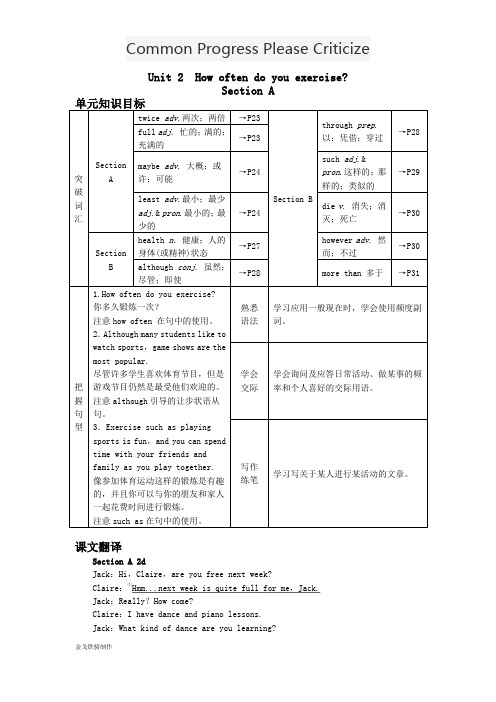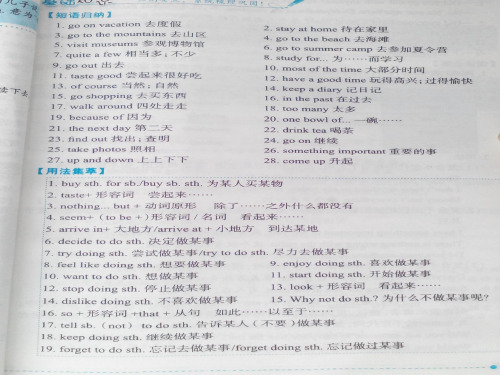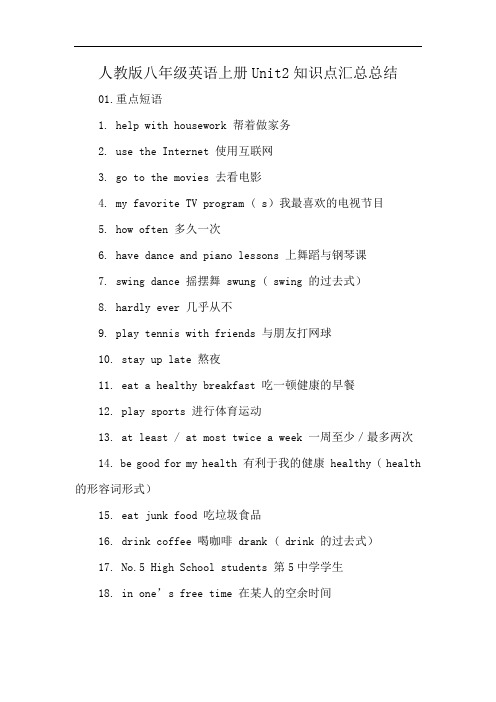八年级上册NO.2
- 格式:docx
- 大小:26.30 KB
- 文档页数:2

Unit 2 How often do you exercise?Section A单元知识目标突破词汇SectionAtwice adv.两次;两倍→P23Section Bthrough prep.以;凭借;穿过→P28 full adj. 忙的;满的;充满的→P23maybe adv. 大概;或许;可能→P24such adj.&pron.这样的;那样的;类似的→P29least adv.最小;最少adj.& pron.最小的;最少的→P24die v. 消失;消灭;死亡→P30SectionBhealth n.健康;人的身体(或精神)状态→P27however adv. 然而;不过→P30 although conj. 虽然;尽管;即使→P28more than 多于→P31把握句型1.How often do you exercise?你多久锻炼一次?注意how often 在句中的使用。
2.Although many students like towatch sports,game shows are themost popular.尽管许多学生喜欢体育节目,但是游戏节目仍然是最受他们欢迎的。
注意although引导的让步状语从句。
3.Exercise such as playingsports is fun,and you can spendtime with your friends andfamily as you play together.像参加体育运动这样的锻炼是有趣的,并且你可以与你的朋友和家人一起花费时间进行锻炼。
注意such as在句中的使用。
熟悉语法学习应用一般现在时,学会使用频度副词。
学会交际学会询问及应答日常活动、做某事的频率和个人喜好的交际用语。
写作练笔学习写关于某人进行某活动的文章。
课文翻译Section A 2dJack:Hi,Claire,are you free next week?Claire:①Hmm...next week is quite full for me,Jack.Jack:Really?How come?Claire:I have dance and piano lessons.Jack:What kind of dance are you learning?Claire:Oh,swing dance. It's fun!I have class once a week,every Monday.Jack:How often do you have piano lessons?Claire:Twice a week,on Wednesday and Friday.Jack:Well,how about Tuesday?Claire:Oh,I have to play tennis with my friends.But do you want to come?Jack:Sure!,杰克:你好,克莱尔,下周你有空吗?克莱尔:呣……下周我很忙,杰克。

Unit 2 Keeping Healthy1.look well看起来好2.What′s wrong with sb.怎么了3.What′s the matter with sb.4.What′s the trouble with sb.5.I′m sorry to hear that.听到这个消息我很难过6.I hope you will get well soon.我希望你早日康复7.have a cold/a toothache /a fever/a cough/a backache/astomachache/a sore throat /the flu /sore eyes感冒/牙疼/发烧/咳嗽/背疼胃疼/咽喉发炎/流感/眼疼8.Enough+名复/不可数名词----足够的9.形/副+enough----足够地10.You′d better=You had better 你最好------11.feel terrible 感觉难受12.don’t read for too long 不要看书太久13.Drink enough boiled water喝足够的开水14.Lift heavy things举起重的东西15.Stay in bed 卧床,待在床上16.Have a good sleep(名)=sleep (动)wel l好好睡觉17.一是一觉一保持,起来四个,变了四个is,am,are---feel---keep:look,sound,smell:taste,become,get,turn,grow18.How long have you been like this----For two days.19.Take/have some medicine服药20.Take sb./sth. to somewhere带某人或某物去某地21.Take/have a rest休息22.Day and night日日夜夜23.How are you feeling=how do you feel你感觉怎么样?24.I′m feeling=I feel25.Not bad.还行not so well. 不是很好26.A little better好些了much better好多了27.Feel like doing sth.=want/would like to do sth,想要做某事28.You had better(not) do sth.你最好(不)做某事29.You should (not) do sth.你(不)应该做某事30.go to see a doctor 去看病31.hot tea with honey 加蜂蜜的热茶32.brush teeth刷牙33.动+too much+形则多. 太多的34.Much too +形/副太多的35.Too many+名复太多的36.Fall down摔倒37.Fall off从摔下38.Go up上升39.Ran to sb.跑向某人40.Look afte rwell=take good care of照顾好41.Take sb. home带某人回家42.Call a taxi叫出租车43.Have an accident发生一场事故44.Do a difficult jump做一个难度大的跳跃45.Two pieces of advice两条建议46.Ask for a leave请假47.Ask for a week′s leave请一周的假48.Ask for three weeks′leave请三周的假49.Ask sb.(not) do sth.让某人(别)做某事50.Ask for请求51.Return to +地点=come back/go back to +地点返回某地52.Return sth. to sb.=give back sth. to sb.把某物归还某人53.Worry about = be worried about为担忧/担心54.don`t worry 别担55.It′s nothing serious.没什么严重56.thank you for--- 因---而感谢你57.not----until--- 直到----才----58.both----and--- ------和-------都是---59.be bad for对------有害60.follow the doctor′s advice接受医生的建议61.Plenty of= lots of+名复/不可是数名词许多62.What caused it 什么引起的63.On TV在电视上64.Stay up熬夜65.Do morning exercises做早操66.Throw litter around乱扔垃圾67.Put into把-------放进-----68.keep the air clean and fresh保持空气清新69.Keep fingernails long(形)留长指甲70.Go to bed early(副)早睡71.Get up late(副)早起72.Wash hands before meals饭前洗手73.Play sports right after meals饭后立刻做运动right(副:立刻,马上74.Go to school without breakfast不吃饭去上学75.Brush teeth twice a day每天涮两次牙76.Show sth. to sb.=show sb. sth.给某人看某物77.Give up doing s th=stop doing sth.放弃(禁止)做某事78.Have a bath洗澡79.Force sb. to do sth.强迫某人做某事80.As soon as 一就81.Make sb. do sth.使某人做某事82.Be surprised to do sth.对感到惊讶83.By chance偶然84.Be careful (not) to do sth.当心(不)要做某事85.Be always doing sth.老是,一再地做某事86.Take showers洗澡87.Tidy our rooms整理我们的房间88.Not only but also不仅…而且…e sth. to do sth.使用某物做某事90.In fact 事实上91.All the time 一直92.Keep/stay away from远离93.At once= right now立刻马上94.Prevent/stop/keep sb. doing sth.阻止做某事95.Take some cold pills服感冒药96.Lie down躺下97.Work on the Internet too long通过电脑工作太长98.Play/do sports做运动99.Change one′s clothes换衣服100.Could /May/Can I speak to sb.请找接电话好吗?101.本人:This is sb. speaking.102.不:I′m sorry he is busy now./Sorry,he isn′t here/in. 103.Ring sb. up打电话给某人104.Call sb. up105.Call sb.106.Give sb. a call107.Leave a message( to sb.)留言,留口信108.Take a message (for sb.)=give sb. a message给某人捎口信109.Forget to do sth.忘记去做某事(没做)110.Forget doing sth.忘记曾经做某事(已经做过)111.Do some cleaning做扫除By oneself独自,单独地112.Give a talk做讲演(报告)113.Try to do sth.尽力或设法去做某事114.On one hand一方面on the other hand 另一方面115.Say no to sb./sth. 拒绝某人或某物116.It′+形+for sb.to do sth. 对某人来说,做某事是117.Fast food快餐118.比较级and比较级:越来越119.The 比较级,the比较级:越(就)越120.the more exercise,the better.锻炼越多,越好121.Warm up作准备活动122.stop to do sth.停下来去做某事(停下来去做另一件事)123.stop doing sth.停止做某事(停止正在做的事)124.instead of代替125.suggest(动)---- suggestion(名)建议126.medicine(不可数名词)药---pills(名复)药片127.t oo th---t ee th牙128.lie—lay(过去式)—lying(现在分词)—lain(过去分词)躺129.check over检查130.with---without131.tomato—tomato es西红柿132.potato –potato es土豆133.sleep(名,动:睡觉)---sleep y(形:欲睡的,困乏的)---a sleep (形:睡着的,已死的)134.as as possible 尽量---地135.build sb. up增强某人的体质136.read in the sun在阳光下读书137.Must +主138.yes, 主+must. No,主+needn′t .no,主+don ′t have to. 139.May +主140.yes, 主+may. No,主+mustn′t .no,主+can′t .141.Need +主142.yes, 主+must. No,主+needn′t.。


人教版八年级英语上册Unit2知识点汇总总结01.重点短语1. help with housework 帮着做家务2. use the Internet 使用互联网3. go to the movies 去看电影4. my favorite TV program ( s)我最喜欢的电视节目5. how often 多久一次6. have dance and piano lessons 上舞蹈与钢琴课7. swing dance 摇摆舞 swung ( swing 的过去式)8. hardly ever 几乎从不9. play tennis with friends 与朋友打网球10. stay up late 熬夜11. eat a healthy breakfast 吃一顿健康的早餐12. play sports 进行体育运动13. at least / at most twice a week 一周至少/最多两次14. be good for my health 有利于我的健康 healthy ( health 的形容词形式)15. eat junk food 吃垃圾食品16. drink coffee 喝咖啡 drank ( drink 的过去式)17. No.5 High School students 第5中学学生18. in one’s free time 在某人的空余时间19. ask them about their free time activities 询问他们关于他们的业余活动20. not … at all 根本不…21. go online 上网22. be surprised that ..感到惊讶23. use it for fun 为了取乐而使用它24. the answers to the questions 这些问题的答案25. one to three times a week 一周一到三次26. two percent of the students 2%的学生27. the best way to do sth.做某事的最好方式28. such as 例如29. spend time with your friends 与你的朋友共度时光spent ( spend 的过去式)30. spend time on sth./ in doing sth.花时间在某事上/做某事31. play together 一起玩32. watch TV for over 2 hours 看两个多小时电视33. go to the dentist 去看牙医34. a 16-year-old high school student 一名16岁的中学生35. have a lot of good habits 有许多好习惯36. more / less than two hours 多/少于两小时37. go to the dentist for teeth cleaning 去牙医处清洁牙齿38. go to the shopping center 去购物中心02.重点句子语法聚焦1. --What do you usually do on weekends?你在周末通常做什么?--I always exercise.我总是锻炼。

八年级上册英语unit2听力English:The listening content in Unit 2 of the 8th grade textbook is about a conversation between two friends, Sarah and Kevin, discussing their plans for the weekend. Sarah suggests going to a new restaurant in town, but Kevin prefers staying home and watching a movie. They eventually decide to compromise by cooking dinner together and then watching a movie at Sarah's house. Throughout the conversation, they use expressions like "How about", "I'd rather", and "Let's". This listening exercise not only helps students practice their listening skills but also introduces common phrases used in making suggestions and expressing preferences.Chinese:八年级教材第二单元的听力内容是关于两个朋友莎拉和凯文讨论周末计划的对话。
莎拉建议去镇上的一家新餐厅,但凯文更喜欢待在家里看电影。
他们最终决定通过一起做晚餐然后在莎拉家看电影来妥协。
在对话中,他们使用了诸如“怎么样”、“我宁愿”和“让我们”的表达。

新版八年级英语上册unit2教案(实用版)编制人:__________________审核人:__________________审批人:__________________编制单位:__________________编制时间:____年____月____日序言下载提示:该文档是本店铺精心编制而成的,希望大家下载后,能够帮助大家解决实际问题。
文档下载后可定制修改,请根据实际需要进行调整和使用,谢谢!并且,本店铺为大家提供各种类型的实用范文,如学习资料、英语资料、学生作文、教学资源、求职资料、创业资料、工作范文、条据文书、合同协议、其他范文等等,想了解不同范文格式和写法,敬请关注!Download tips: This document is carefully compiled by this editor. I hope that after you download it, it can help you solve practical problems. The document can be customized and modified after downloading, please adjust and use it according to actual needs, thank you!In addition, this shop provides various types of practical sample essays, such as learning materials, English materials, student essays, teaching resources, job search materials, entrepreneurial materials, work examples, documents, contracts, agreements, other essays, etc. Please pay attention to the different formats and writing methods of the model essay!新版八年级英语上册unit2教案了解音乐的分类;学会用“It’s great! I love it! It’s not my favorite, but I don’t mind it. I hate this kind of music.”等句子表达自己的情感,提高听、说、读、写等综合运用语言的能力。
初中英语人教版八年级上册第二单元知识点Unit 2 How often do you exercise?n A1.How often do you exercise?how often对做某事的次数/频率进行提问,常用表示频率的词进行回答,如:always。
usually。
often。
sometimes等。
2.表示频率的短语次数+一段时间“多久一次”次数为三次及以上:“基数词+times”如:once a day。
twice a week。
three times a month。
3.Hi,Clair。
are you free next week?sb be free= sb have time某人有空Are you free?=Do you have time?XXX某物是免费的XXX.糊口中最好的工具是免费的。
4.Hmm。
next week is quite full for me.be quite full for sb=be quite busy for sb某人很忙5.She said it’s good for my health.health (n.)安康---XXX(adj.)安康的XXXBe in good health=healthy身材安康Grammar focus1不安康的6.How often的用法how often用来对透露表现做某事的频次举行发问,回覆时能够用透露表现频次副词或透露表现频次的短语举行回覆。
如:How often do you go shopping?1)---Ioftengo shopping。
(频次副词回覆)2)---I go shopping twice a week。
(频次短语回覆)2.频次副词位置:be之后,动之前。
(be动词之后,Shiite动词之前)频率词及发生概率大小(由大到小):Always。
usually。
often。
sometimes。
牛津版英语八年级上册Unit2◆知识探究Step One Reading& Listening1.Read a story about numbers.number 此处用作可数名词,意为“数字”。
number还可意为“电话号码”。
【拓展】number 还可用作及物动词,意为“标序号,给...编号”Please number the pictures.【随时练】-- Hello, is that Jenny speaking?-- Sorry, I’m afraid you have got the wrong ____________.A.numberB. nameC. addressD. message2.Check some Maths problems.(1)check 及物动词,“检查,核实”【拓展】check 的相关短语check in 登记,检票check out 办清手续后离开check up 检验I will meet Jane at the station, please _________ what time she will arrive.A.countB.chooseC. checkD. Catch(2)problem 可数名词,“问题,难题”辨析:problem 与question【拓展】(1)have problems in doing sth. 做某事有困难(2)No problem. 没问题。
1.The food safety is a serious _______ in our country. We should try to solve it.A.subjectB.programC. problemD. Opinion2.You can ask me any ________A. questionsB. problemC. questionD. problems3.The king’s favourite game was chess.favourite “最喜欢的”,通常位于名词前作定语,没有比较级和最高级形式,在含义上相当于like bestWhat’s sb’s favourite ...? = What ... d o/ dose sb. like best?【拓展】也可用作名词,意为“最喜欢的人或物”This book is my favourite.4. play chess 下象棋play card 打牌play football,play basketball(play +棋牌、球类运动)play the piano 弹钢琴play the violin 拉小提琴(play + the+乐器)5. One day, a wise old man came to the palace and the king challenged him to a game.(1)one day “某一天,有一天”辨析:one day与some dayone day (过去)有一天,(将来)某一天,用于过去时或将来时some day (将来)总有一天,只用于将来时Eg:I think ,y dream will come true one day /some day.我想我的梦想有一天会实现。
Be动词的用法及介绍
“Be”动词的意思是”是”,它随人称的变化而变化.
1. be动词属于系动词, 在句子中主要表现为三种形
式:am is、are。
后面往往接形容词或名词做表语。
如:
(1)I’m young. (young形容词做表语)
(2)He is a boy.( a boy名词做表语)
含有be动词的句子在进行否定、疑问句变化时,都要在be动词上变化。
动词的基本形式英语动词有五种基本形式,即动词原形、过去式、过去分词、现在分词和第三人称单数形式。
如:work—worked—worked—working—works。
I ____ (work) in the school.But my sister____(work) in a hospital .
My father_____(work) in the bedroom now.
形容词的比较级用于两个人或事物的比较,其结构形式如下:
主语+谓语(系动词)+ 形容词比较级+than+ 对比成分。
也就是, 含有形容词比较级的主句+than+从句。
注意从句常常省去意义上和主句相同的部分, 而只剩下对比的成分。
Our teacher is _____than we are. 我们老师的个子比我们的高。
It is_______ today than it was yesterday. 今天的天气比昨
天暖和。
This picture is______ _________than that one. 这张照片比那张照片漂亮。
This meeting is_____ __________ than that one. 这次会议不如那次会议重要。
The sun is ______ ________than the moon. 太阳比月亮大得多。
形容词最高级的用法:
形容词最高级用于两个以上的人和物进行比较, 其结构形式为:
主语+谓语(系动词)+the+形容词最高级+名词+表示范围的短语或从句。
She is____ _______student in her class.
她是班上最好的学生。
Shanghai is one of _____ ______cities in China.
上海是中国最大城市之一。
有关形容词的几个特殊用法:
"The+形容词比较级..., the+形容词比较级..."表示" 越... 就越..."。
The ____(much) you study, the ____ (much) you know. 你学的越多, 就知道的越多。
The _____(much), the _____(good). 越多越好。
" 形容词比较级+ and + 形容词比较级", 表示" 越来越... "。
It's getting _____and_____(hot). 天气越来越热了.
The computer is______and ______(cheap). 计算机越来越便宜。
主语+谓语(系动词)+as+形容词或副词原形+as+从句。
表示两者对比相同。
This box is as _____ as mine. 这个盒子和我的一样大。
This coat is as_____ as that one. 这件衣服同那件衣服一样便宜。
I study English as ______as my brother. 我同我兄弟一样学习努力。
the + 形容词表示某种人。
He always helps ________. 他经常帮助穷人。
I like to have a talk with ______. 我喜欢同年轻人谈话。
5) eevery day 与everyday
1. eevery day 作状语,译为“每一天”。
如
We go to school at 7:10 ______ _____.
我们每天7:10去上学。
I decide to read English _______ ______.
我决定每天读英语。
2. everyday 作定语,译为“日常的”。
What's your __________ activity?
你的日常活动是什么.
6) 什么是助动词
1.协助主要动词构成谓语动词词组的词叫助动词。
被协助
的动词称作主要动词。
助动词自身没有词义不可单独使用例如
He doesn't like English. 他不喜欢英语。
doesn't是助动词无词义like是主要动词有词义
2.助动词协助主要动词完成以下功用,可以用来
a. 表示时态,例如
He ____ singing. 他在唱歌。
b. 表示语态,例如
The story ____ _____ ____(make up). 这个故事是编造的。
c. 构成疑问句,例如
____ you like college life? 你喜欢大学生活吗
______ you study English before you came here? 你
来这儿之前学过英语吗
d. 与否定副词not合用,构成否定句,例如
I ______ like him. 我不喜欢他。
e. 加强语气,例如
_____ come to the party tomorrow evening. 明天晚上一定来参加晚会。
He _____ know that. 他的确知道那件事。
3.最常用的助动词be, have, do, shall, will, should, would
7) forget doing/to do与remember doing/to do
1.forget to do 忘记要去做某事。
(未做)
forget doing 忘记做过某事。
(已做)
The light in the office is still on. He forgot to turn it off.
办公室的灯还在亮着它忘记关了。
(没有做关灯的动作)
He forgot turning the light off. 他忘记他已经关了灯了。
( 已做过关灯的动作)
Don't forget to come tomorrow.
别忘了明天来。
(to come动作未做)
2.remember to do 记得去做某事(未做)
remember doing 记得做过某事(已做)
Remember _____ _____(go) to the post office after school.
记着放学后去趟邮局。
Don't you remember ______(see) the man before?
你不记得以前见过那个人吗?
8) It's for sb.和It's of sb.
1.for sb. 常用于表示事物的特征特点,表示客观形式的形
容词,如easy, hard, difficult, interesting, impossible等It's very hard ____ him to study two languages. 对他来说学两门外语是很难的。
2.of sb 的句型一般用表示人物的性格,品德,表示主观
感情或态度的形容词如good, kind, nice, clever, foolish, right。
It's very nice ____ you to help me. 你来帮助我,你真是太好了。